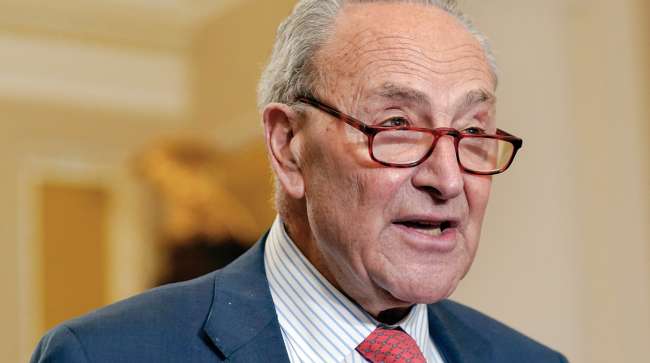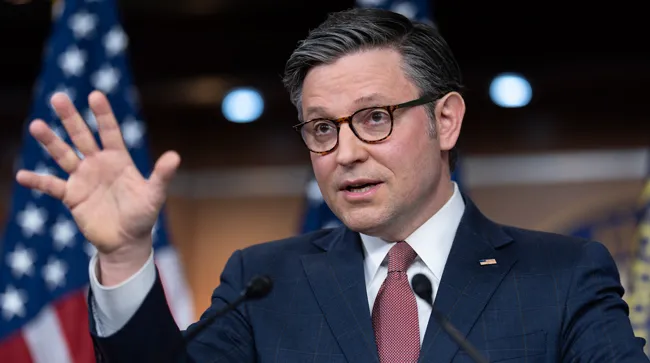Senior Reporter
Shutdown Looms as Congress Debates Transportation Funding

[Stay on top of transportation news: Get TTNews in your inbox.]
WASHINGTON — The top Democrat in the Senate called on colleagues to finalize comprehensive funding measures to avert a federal shutdown on Dec. 20.
Shortly after returning to Washington after the Thanksgiving recess, Senate Majority Leader Chuck Schumer (D-N.Y.) pointed to the need to approve bipartisan fiscal 2025 bills for operations at the Department of Transportation and other agencies. He also downplayed the effectiveness of temporary measures known as “continuing resolutions” for government funding purposes. The so-called CRs have recently been the tool of choice for Congress to extend federal funding authority absent the approval of full fiscal year bills.
Congress is working to clear for President Joe Biden fiscal 2025 legislation prior to this month’s deadline. The funding bills are among the measures on Congress’ radar during this post-election lame-duck session. A new session of Congress is scheduled to start in early January.
“On government funding, both sides are making progress negotiating on a bill that can pass both the House and Senate with bipartisan support,” Schumer said this month. “We need to keep divisive and unnecessary provisions out of any government funding extension, or else it will get harder to pass a [continuing resolution] in time.
“For now,” the Senate leader continued, “I am pleased negotiations are on the right track and I thank the appropriators in both chambers for their good work.” Schumer’s call to action has been echoed by his leadership team in the chamber.
On the House side, Speaker Mike Johnson (R-La.) and senior Republicans have yet to schedule votes for fiscal year measures during the current lame-duck legislative session. Inaction on funding measures raises the potential for Congress to approve another short-term continuing resolution that would avert a shutdown until March.

Johnson and senior Republicans have yet to schedule votes for fiscal year measures during the current lame-duck legislative session. (J. Scott Applewhite/Associated Press)
Following President-elect Donald Trump’s reelection, Johnson has emphasized the party’s agenda for next year. “Congress has been given a clear mandate from the American people, and we look forward to working with President Trump to secure our borders, cut taxes, reduce inflation, slash bureaucratic red tape, restore America’s dominance, rebuild our military, and instill fear in our overseas enemies,” Johnson said recently.
“In order to enact President Trump’s agenda, it will take each and every Republican working together,” added Senate Leader-elect John Thune (R-S.D.). “Speaker Johnson and I had a productive meeting today getting organized for the work ahead, and I look forward to our partnership as we reverse the Biden-Harris agenda and advance President Trump’s priorities on behalf of the American people.”
Lori Heino-Royer of Waabi discusses the latest developments, breakthroughs and key industry partnerships in autonomous trucking. Tune in above or by going to RoadSigns.ttnews.com.
This year, the Senate Appropriations Committee backed a transportation bill that would provide $964.5 million for the Federal Motor Carrier Safety Administration. A House committee-passed version of the bill would provide FMCSA with $909 million. The House bill also would dedicate $200 million for parking expansion projects for commercial truck drivers.
In addition to funding legislation, Congress is expected to schedule consideration of the annual Pentagon policy measure. The National Defense Authorization Act, as it’s known, includes a provision meant to enhance oversight of the implementation of the Global Household Goods Contract. A coalition of professional movers and independent owner-operators have raised concerns about the GHC. The U.S. Transportation Command maintains that the new GHC is designed to improve the relocation process for military personnel and their families.
Schumer expressed optimism about the annual defense bill’s passage this month. “On the NDAA, I am hopeful that we are close to beginning the process of moving a bipartisan bill through both chambers,” the New York senator said. “The NDAA has been passed without fail for decades with cooperation from both sides, and I hope this year there is no exception. Few priorities matter more than providing for our national defense and taking care of our troops in uniform and their families.”
Recently, congressional policymakers announced they arrived at a final version of a water infrastructure bill. The announcement sets up its passage as early as this month. The biennial Water Resources Development Act 2024, already approved in the House and Senate, would provide billions of dollars for the nation’s network of ports, dams and canals.
Want more news? Listen to today's daily briefing below or go here for more info:





